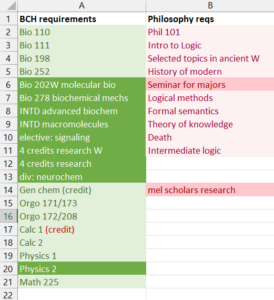Among my friends, the most common reason for choosing Rochester that I hear is our open curriculum. And I love it! The open curriculum has allowed me to do so many cool things beyond the scope of what I thought I would achieve in college, and many of the relationships I’ve made and the plans I have for post-grad have been influenced as a result.
What is the open curriculum, you might ask? Well, compared to other schools, we don’t have gen eds. You take a writing course (WRTG 105) in your first year, but there aren’t any additional restrictions on the subjects you take. Rather, the cluster system allows you to decide what you want to study for yourself, as long as you end up with a minimum of a major in one of the three divisions (Natural Sciences, Social Sciences, Humanities) and a cluster consisting of three courses in each of the others. You can do any amount of extra degrees as you’re able to accomplish: for instance, I know a Physics and Astronomy major (NS) with minors in Mathematics (NS) and Economics (SS) and a cluster in Theatre (H). I think the cluster system is especially smart because it grants you both breadth and depth: breadth, because you’re exploring disciplines completely beyond your field of study, and depth, because those three courses allow you to start to really grasp the area you’re diving into.
But if you’re not looking to stack degrees like Lego blocks, the open curriculum also gives you a lot of room to explore. Majors in the Social Sciences and Humanities typically only have 10-12 courses, so assuming you’re taking the normal four courses a semester, that’s only 19 courses required by your degree programs for graduation, meaning you still have to take 13 other courses to have enough credits to actually graduate for real. That’s a lot of electives: it’s no surprise we have so many double-majors! There are also enticing possibilities like doing research or an internship for credit, allowing you to get a better sense of your field and gain professional experience, and you can write a senior honors thesis for 8 credits across two semesters and really take the time to dig into your work.
The rest of this post is going to be me sharing my story. I went about the open curriculum in the opposite way from most: I zeroed in on my degrees for the first two years, and then I finally loosened up and started taking electives. If you know exactly what you want to do going in, this approach could work for you, but many people I’ve spoken to have been happiest getting to explore at first, and landed up on a major that really suited them that they might not have come to without that elective exploratory phase. Whatever you want to do with the open curriculum is correct: it’s open for a reason : )
Here is my most embarrassing secret: I am a spreadsheet fanatic. I have spent hours upon hours editing an Excel sheet with my four-year course plan, and color-coding each major and making custom cell types so that I’d have a distinct color for courses I’ve taken, courses I know when I’m taking, and courses that I will take but haven’t figured out when. It is a labor of love and it is not for the faint of heart.
Going into freshman year, I made my spreadsheet with my two intended majors: Molecular Genetics and Philosophy (I wasn’t sure about my SS cluster yet, or that would’ve been on there too). I started my first semester with the two lowest PHIL courses required for my Philosophy major (ten courses total), and Biology I and Organic Chemistry I for Genetics (many courses total). While the bio and chem were pretty standard for my major, I intentionally pushed WRTG 105 to the spring so that I could continue in a pattern of half of my courses being for each major every semester. 
In the spring of my freshman year, I switched to Biochemistry, which worked for all the courses I’d taken so far and was actually more sequential, meaning less uncertainty about where I’d need to slot my upper-level electives. I took two philosophy electives (towards the 5 total required), bio II and organic chemistry II, and my writing requirement. I also got course credit for being a workshop leader, which doesn’t count towards any major but does go to the 128 credit hours required for graduation. At this point, all the 4-credit courses I’d taken had been directly towards a major, which was pretty atypical for the rest of my friends, who were trying things out before figuring out what cluster or minor they wanted to settle on.
After much soul-searching and consulting with my general college advisor, I decided on a Linguistics cluster, or possibly a minor. One of the Philosophy courses I’d taken (Formal Semantics) was cross-listed as Linguistics, meaning I’d only need another 2 courses to complete the cluster. Curriculum: gamed. This was before I realized that I do in fact really like Linguistics, which occurred to me as I took my second cluster course in the spring of my sophomore year.
But now I’m in my sophomore fall. I take Genetics, because that’s the next in my bio sequence, and Inorganic Chemistry, because all my friends are taking it and I figure it’ll count as my Biochemistry diversification elective. I also take two more Philosophy electives (getting to ⅘ electives accomplished) and a Philosophy foundational course (⅗ accomplished). I was really burnt out after that semester, probably because you shouldn’t make it a habit to take five courses every time, and so I decided to take it easy for the spring.
Sophomore spring, I took my final Philosophy elective Death (5/5), the next biology course, my second Linguistics cluster course, and Intermediate Logic. That one was interesting, because it was cross-listed as Math and Philosophy, and I took it to be my math diversification elective. However, halfway throughout the semester I got approved for one of my electives to count as a foundational course, moving me to ⅘ electives satisfied and ⅘ foundational courses, and I was able to get Intermediate Logic counted towards my Philosophy electives as well.
At this point I should also preface that I took Calculus I and gen chem in high school, and Calculus II over the summer. I was slated to take Physics I over the summer, meaning that for my remaining 4 semesters of college, I really only needed to take 9 more classes and get an extra two credits somewhere to graduate. At the rate I was going, that was only about two semesters worth. What was I to do?
I took a long, hard look at myself, and I finally started thinking about what I wanted to take. I love my majors, but there’s something very special about taking a class for the hell of it. I decided to add a minor in Chemistry to reinforce a topic I was passionate about, meaning that my Inorganic Chemistry credit would now go to that, and I decided to take a Neurochemistry course as my diversification. I’ve loved it so far, and I’m so grateful to be venturing further outside my comfort zone.
For the spring, I’m taking my next biochemistry sequence class, research for course credit to finish my lab requirement, and six whole credits towards my Chemistry minor: Bioorganic Chemistry, and Nanoporous Materials. I’m also taking my first real electives: Pharmacology and Advanced Acting. I’m very excited to learn more about both of them, and to feel a little more easygoing about the potential ramifications on my grad school future.
As for senior year, I know that I need the last biochemistry courses in my sequence as well as one elective that I’m pretty set on, the senior seminar for my Philosophy major, the last course for my cluster, and one more chemistry course. But there’s room for more: I might look into neuroscience again, or computational biology, or do more theatre, or something entirely different. That’s the beauty of the cluster system, and although it took me longer than most to see it as more than a means of accumulating degrees, I’m so very grateful to have it as part of my college experience.


